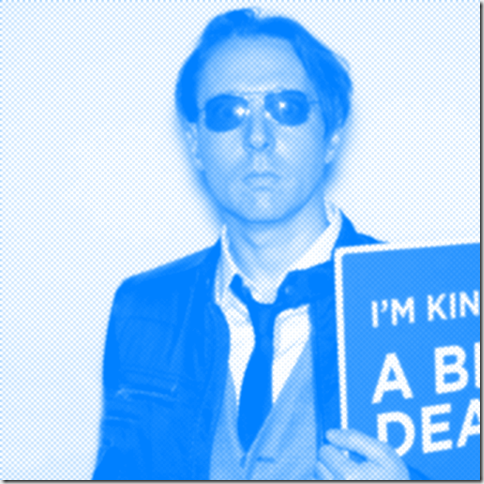Michael is a former game developer for Electronic Arts with a physics PhD from the University of Colorado Boulder who now works as a principle dev lead in the HoloLens group. He also led the teams that worked on spatial mapping and inside-out-tracking for the HoloLens.
He is an amazing speaker about topics related to AR and VR. I should probably admit, at this point, that I actually listen to bootleg recordings of some of his talks. It isn’t that he’s saying anything proprietary so much as that, even when his talks aren’t officially recorded, some of us in the HoloLens dev community make a point of recording his public talks anyways and pass them around because – as I mentioned – he’s an amazingly knowledgeable and thought provoking speaker.
Even if you don’t have access to the Gourlay bootleg tapes (2016-2017), there are plenty of talks available online that you should definitely peruse in order to start understanding how Michael views the world and the role that AR technology like the HoloLens plays within it:
- AR + VR Development at the Orlando Science Center
- Presentation to the Florida Interactive Entertainment Academy
- Insider Tips for Developing on VR and AR Platforms
- Exploiting Strengths and Avoiding Pitfalls in VR/AR Design
Here are Michael’s answers to the 10 Questions.
What movie has left the most lasting impression on you?
Miller’s Crossing. Among its many themes, one of my favorites is that no matter how calculating you might be, you can’t always explain your actions. I spend a lot of time strategizing but ultimately I make decisions based on intuition.
What is the earliest video game you remember playing?
Space Invaders, in a cabinet at a pizza restaurant in Florida. I have a massive collection of Atari 2600 games from the 1970’s. I keep it because it reminds me how I got started doing what I do.
Who is the person who has most influenced the way you think?
A person very special to me, MFT, who has taught me the value in being deeply and genuinely curious about people.
When was the last time you changed your mind about something?
I change my mind so frequently I don’t keep track; I keep my mind in a superposition of multiple decisions and the weights of each possibility shift as new information and insights arrive, which is constantly, even while I sleep and shower.
What’s a skill people assume you have but that you are terrible at?
People might assume that I have confidence and know what I’m talking about because I tend to make declarative statements that might sound like claims about a fact of this world. But those statements are often just me thinking out loud while I’m imagining a world where that statement is the case. I live in my head, in a world with many possibilities but when I speak, I pluck out and verbalize some hypothetical version to try it on for size. I might, immediately after hearing myself say something out loud, decide it’s wrong.
What inspires you to learn?
Curiosity about the way the world works, and a desire to tinker with that. I also love being able to transfer what I’ve learned. I feel like learning is difficult for me and that I remember the snags I encountered, which sometimes makes me able to explain ideas to people who are also not subject-matter experts, because I can dodge the same snags. I love to dabble in lots of knowledge areas.
What do you need to believe in order to get through the day?
My motivation comes from believing my actions help people achieve more together. I value bringing people together and helping them making impact on others. Ironically sometimes I do that by working solo to make tools meant for others, who think differently from me, to use.
What’s a view that you hold but can’t defend?
I feel like I say almost daily, that I’m making a claim I can’t defend, but my intuition tells me it might be the case. I start there, form hypotheses, then ideally gather a preponderance data and test the hypotheses. But all cost is opportunity so often I have to make decisions based on a paucity of data.
A recurring indefensible view is that cooperation permits more value than does competition, borders impede progress and people who seek to bridge distances between persons are better than people who defend territories. But the world seems to run on competition so I feel lonely trying to espouse that view.
What will the future killer Mixed Reality app do?
Virtual companions will reside in your brain, talking to you telepathically in your own voice. Today’s mixed reality platforms are a stepping stone to a fusion of humans and computers where we blur the lines between thought, computation, exotic sensors and retrieval of salient information. The ultimate augmentation will be to your inner monologue.
What book have you recommended the most?
Understanding Comics. It’s about how to communicate with a continuum of images spanning abstract (words) to concrete (pictures), and about how we complete stories when information is omitted. Comics permit a kind of universal story-telling language that requires only very low technology (cave paintings, ink on paper) but which modern technology (e.g. the web) effortlessly enhances.

[…] 10 Questions with Michael Gourlay (James Ashley) […]